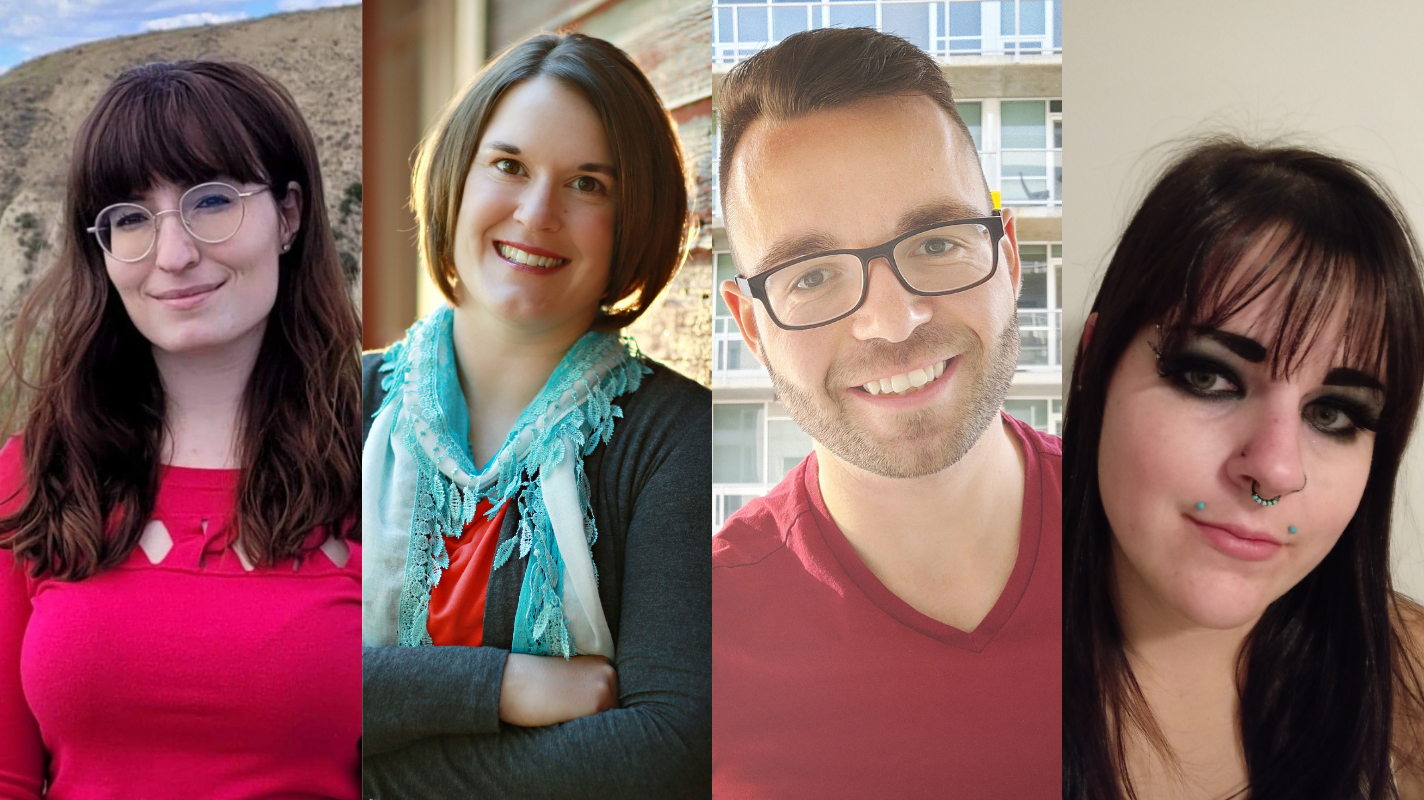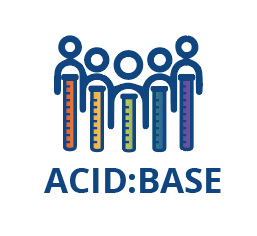If you are interested in the chemical sciences and want a safe place for marginalized groups in chemistry, run, don’t walk, to join ACID:BASE!
Dr. Stacey Wetmore first became interested in computers in middle school when her school acquired brand new Commodore 64 computers. “Computers weren’t common to have in your house at that time, but I really wanted to get my hands on one. The problem is that the boys got to take computers, as they were part of the ‘shop class,’ and the girls were part of ‘home economics’ class, which was sewing and cooking. I asked and was told, ‘no, Stacey, because you’re a girl, you’re going to learn to cook and sew.’ Neither of which I do today,” she laughs. To have her curiosity met with exclusion at such a young age is an experience Stacey carried throughout her education. “That was one of my first experiences of seeing the difference in treatment I might face as a woman in science. I think my story pales in comparison with others. There are people with huge, impactful stories that showcase the need for inclusivity in the chemistry community,” she adds.
Stacey is a professor within the Department of Chemistry & Biochemistry, a Tier I Board of Governors Research Chair, and the 2021 Speaker Research Award winner. Throughout her career, Stacey has watched as the world of chemistry continuously diversifies and evolves to catch up with the times, just not always fast enough.
While completing her combined undergraduate degree in math and chemistry, she remembers being in a class of predominantly female students, an anomaly. She also remembers a professor lecturing that women in chemistry ‘struggle in the workforce, if they enter it at all, because they only memorize the concepts rather than apply the knowledge.’ What now sounds appalling was once a more commonly expressed view. She also attended conferences in the past with only a handful of women among hundreds of participants.
These experiences did not deter her. With determination, Stacey began her career in computational chemistry, a field that is still male-dominated. “I was used to having all-male colleagues. In my first faculty position at another university, I joined the department as the first and only female chemistry research professor.”
During the pandemic, Stacey reflected on these experiences in the sciences and remembered encountering clubs that might provide a safe space for marginalized groups in chemistry. CWIC was originally established by the Chemical Institute of Canada years ago when it stood for ‘Women in Chemistry.’ “Now, things have changed. They’ve kept the acronym, but it now stands for Canadians Working for Inclusivity in the Chemical Sciences, Engineering and Technology, which I can get behind. It’s bigger than women in chemistry. It’s marginalized people in chemistry.” Stacey explains that ACID:BASE is the name for the local uLethbridge chapter of the CWIC and stands for the Association of Chemists for Inclusivity and Diversity: Building Advocacy, Solidarity and Education (ACID:BASE).
ULethbridge is a diverse, dynamic environment and only grows more so as the years pass. Looking out at her classes and research group, Stacey can see incredible diversity. “What inspired me to start a chapter of CWIC on campus was the intention of coming forward and providing a spot for any chemistry student to have discussions and learn how to support everybody to succeed in chemistry. I want to create a safe place for everyone to come and feel supported.”
To gauge interest, Stacey brought the idea of forming a local CWIC chapter to some members of her lab. “Some were international students. Some were grad students. I wanted to gauge their interest.” To Stacey’s delight, the students were incredibly excited and enthusiastic. “They were so excited about it!” she smiles. ULethbridge is not the first university to start a local chapter of the CWIC, and many large universities already have one. However, Stacey finds pride in uLethbridge establishing a chapter as a smaller university.
“ACID:BASE is for graduate and undergraduate students, as well as faculty and staff. At its core, the club is student-driven,” Stacey adds. She approached Dr. Jean-Denys (JD) Hamel, another chemistry faculty member who showed enthusiasm for the initiative. “As a young queer scientist, I benefit from social changes that led to members of the LQBTQ2+ community being far less marginalized and oppressed. I feel like supporting the ACID:BASE club is my chance to give back and to help all marginalized communities find a platform to discuss inequities and be listened to,” says JD. As faculty representatives for the ACID:BASE chapter of the CWIC, Stacey and JD were able to help get the club running with student co-chairs, PhD student Briana Boychuk, and MSc student Sam Drescher (BSc ’20).

“I chose the U of L through a connection with my previous undergrad research supervisor, who recommended Stacey to me. We then corresponded, and well, here I am completing my PhD in computational chemistry!” exclaims Briana. “This club started with Stacey, and I thought it was a fantastic idea. I helped co-found the club, researching how to form the club and what we needed to do to become an official CWIC chapter recognized by the national association. I drafted the club’s constitution, scheduled meetings, met with everyone over Zoom, held elections to find those comfortable and best fit for each role, and learned how to accommodate people in their roles. That’s why we have a lot of co-roles, like co-chairs and co-treasurers, so it’s more teamwork rather than everyone relying on one person.”
Briana notes that it’s easier to draw on people’s talents when they feel supported and not singled out. Having a partner to rely on and work with helps take the pressure off of doing everything yourself. “I was very busy during club rush week, and my co-chair Sam was there to help,” she admits.
In the midst of a global pandemic, Sam began her Master of Science in chemistry, specifically organometallic chemistry, in the Fall of 2020, immediately after completing her BSc in neuroscience. “I am looking forward to a safe space for individuals to discuss both the issues and improvements in STEM and be a part of a group of accepting and inclusive people,” she explains. Sam is in the second year of her master’s and looks forward to connecting with a diverse group of people, especially now that everyone is back on campus.
“STEM should be a field of diverse people. It is important to have viewpoints and ideas from a group of people that have different experiences and challenges as this can significantly contribute to a positive environment for those in STEM and progression in research, as different people will have different views and ideas,” Sam reiterates. Co-chairs Sam and Briana have a common goal of creating a safe space on campus.
Briana explains that bias, prejudice and intolerance still exist today, although in a more subtle form. “This club is necessary because there are still gaps today. It’s there, it’s not as prominent or visible, but it’s still there. It’s still a problem. It’s subtle. Sometimes it’s glaringly out there and sometimes not, but it’s still there, and we need to stand up to that. The percentages don’t lie,” she says. Percentages Briana refers to are the lower ratios of women to men in STEM fields. “We want members to join to show support for the cause, to keep people from feeling isolated. We want to make it visible that people are sharing these struggles,” she adds.
This October 18, ACID:BASE will host an inaugural event, with speakers from across Canada, right in time for National Chemistry Week. This event will become part of a seminar series that brings Canadian chemists from marginalized groups together to open up discussions amongst community members on important topics and difficulties marginalized community members face. Briana secured two chemistry speakers who will share their stories about inclusivity in chemistry. Alison Thompson, Professor and Tier 1 Canada Research Chair at Dalhousie University, will speak about barriers she faced during her career in chemistry as someone who has a disability. Nola Etkin, Professor and Dean of Science at the University of Prince Edward Island, is outspoken about her journey as an out lesbian during her chemistry career. U of L’s brand-new executive director of EDI, Martha Mathurin-Moe, will provide opening remarks for the event.
This is just the beginning. In the future, these collaborators hope to host speaker meet and greets, trivia nights and weekly paper-readings similar to a book club but with scientific research. While the club is more science-focused, Briana says, “We’re not the type of club to turn people away. If you have a reason to join, we would be excited to have you.”
Stacey is eager to accept more members as the club picks up steam. “Anyone can join. Anyone interested in any flavour of the chemical sciences. Anything related to chemistry, and then I can give you the lecture on how everything is related to chemistry! It’s not women in science. It’s members of our LGBTQ+ community and any marginalized group and those who support them.” Currently, ACID:BASE collaborates with other CWIC groups, such as the larger chapter at the U of A, a beneficial cross-collaboration. If you are interested in the chemical sciences and want a safe place for marginalized groups in chemistry, run, don’t walk, to join ACID:BASE!
Learn more about ACID:BASE
ACID:BASE Twitter, Instagram, Facebook
Learn more about CWIC
More Ways to Celebrate National Chemistry Week
Apply by June 30 to start this fall!
Find admission details
Request info
Book a tour
Make an appointment for enrolment advising
